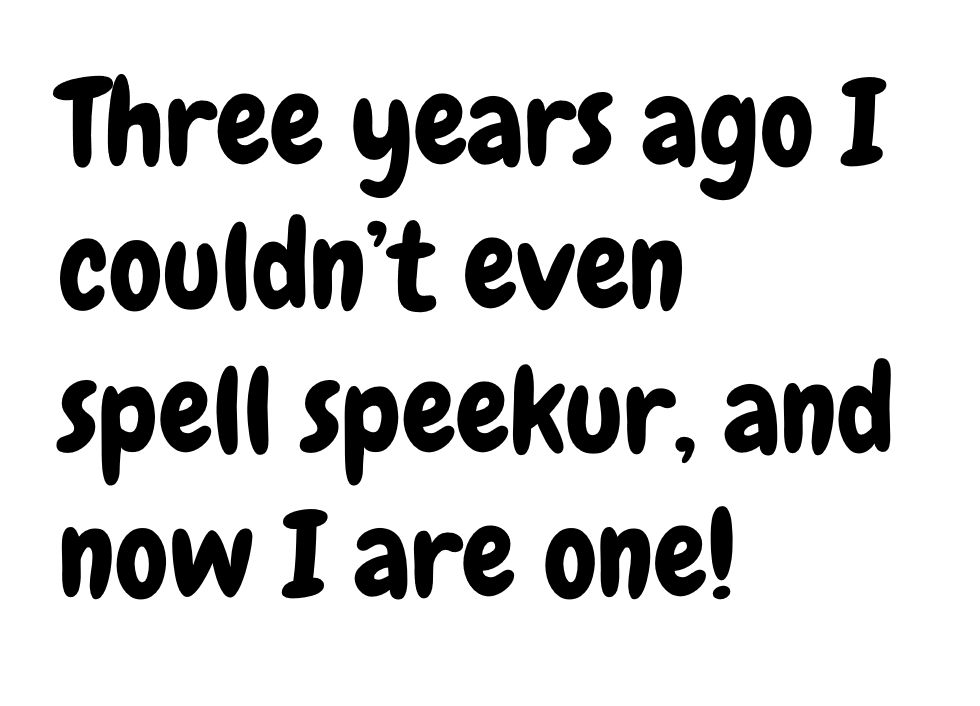10 Reasons Speaking Is Better than Writing

As I said before: I know speakers who write to promote their speaking. I know writers who speak to promote their writing. I do both, and I'm not sure which is primary. I don't really care at this point. But I do know each has its advantages and disadvantages. This is the second list of a pair. The other one considers 10 Reasons Writing Is Better than Speaking. As to which you should focus on, the answer is: yes. They're not polar opposites. After all, Mark Twain was an outstanding writer and an outstanding speaker, and many have followed in his footsteps.
1. You can speak effectively from an outline.
Outlining is a great way to write effectively. You can save a lot of time like that. Pantsing (writing by the seat of your pants rather than following a plan) can lead to a lot of dead ends. But once you have outlined, you still have to write. Rewriting leads to polished prose, but writing and rewriting takes a lot of time. I can write an outline, rehearse with it, and deliver a speech in much less total time than it takes me to write.
2. Nobody expects perfection in speaking.
Audiences expect a certain level of professionalism, but a conversational delivery generally works best for 98% of audiences. Conversation that is too polished comes across as memorized and mechanical. The kind of errors readers might cringe over for years in a published book don't even get noticed in speeches. In that sense, audiences are much kinder than readers.
3. You're not dependent on just the words.
Writing is, of course, a skill. With that developed skill, you can have a deep impact on readers. But it's much harder to have that impact using words alone. A speaker can also bring paralanguage (use of the voice) and nonverbal communication (body language and facial expressions) into the mix. As a writer, I have to resort to typographic tricks to clearly communicate different shades of meaning between saying, "I did not say he stole the money" (vehemently denying that I said it) and "I did not say he stole the money" (I said someone else stole it). With voice and body language I can clearly and easily communicate that difference. Speakers just have more tools, at least of that sort.
4. Communicating emotion is much easier in speaking.
A skilled writer can clearly stir emotion. However, because you have language, paralanguage, and nonverbal communication working together (see above), you in particular have more tools for stirring emotion in a listener than in a reader.
Let's debunk something: you have probably heard that 55% of communication comes from nonverbal communication, 38% from paralanguage, and only 7% from the words. While that figure comes from a study conducted by Dr. Albert Mehrabian in the 1950s, Mehrabian himself has called this the most misused research in social science. It was a single study, and the study was considering the components of effective communication when telling someone bad news. It's still instructive in this instance, though. The reason Mehrabian says this study, as usually cited, is skewed is because what he was studying involved communication with a strong emotional component. The really practical insight, therefore, is that your voice and your facial expressions and body language are really good at moving people.
5. With exceptions, you can make more money speaking.
If you self-publish and price it write you can make $5 a book. With the right book, you can make a lot more than that, but plenty of people make a lot less than that, so $5 seems a good middle ground. So if you sell 1,000 books you make $5,000. But you really have to hone your craft to reach a level of selling 1,000 books, and in any case it is going to take some time for most of us to sell that many books. It's not hard to book one speech for $5,000. Admittedly, it hard to make direct comparisons, because speakers will have other costs of doing business a writer is unlikely to have. But I know several six -figure speakers, and a few seven-figure. I don't know too many writers making that much, at least from writing alone.
6. Speaking yields more adrenaline.
Nothing beats getting in front of an audience. If you go bungee-jumping, hang-gliding, roller-coaster-riding; if you watch scary movies or ski down mountains; if you just ride bumper cars at the county fair, you are seeking a "thrill," and you are paying someone for it. You can speak for free, and other people will pay you for you to experience that adrenaline. Learn to think of "stage fright" as energy, and you can get all kinds of thrills.
7. There are more listeners than readers.
Readers are a special breed. I love going to a bookstore and just hanging out. That's mostly because of the books, but it's also partly being around other book lovers. But voracious readers are not common. Almost a quarter of Americans report having not read all or even part of a book in the last year. It takes a certain amount of effort and commitment.
It takes planning and commitment to hear a speech, too, but a whole different flavor. Plus, a lot of audience members attend because they have a work incentive to do so—their employer pays for them to attend or brings that speaker in for them. Once they arrive, a skilled speaker feels more like an experience than an effort. Sadly, a lot of people find reading anything to be an effort rather than a pleasure. (I don't understand that, but I know it's the case.)
8. You get immediate feedback.
You may get only the most minimal of feedback from readers. Even on electronic media, most don't comment at all. When you speak to an in-person audience, you can read their body language in real time. Zoom audiences will use the chat, and you can gauge your impact immediately from those who have their cameras on. Livestreamers are more isolated, but commenters can react immediately in chat. It can take months after you're written something to know if you had an impact on the readers.
9. You don't have to worry about spelling.
When I wrote about writing's advantages over speaking, I said when you write you don't have to worry about getting pronunciation right. But when you write, you do have to concern yourself with correct spelling. Out loud, nobody can tell how you spelled the word unless you put it on a slide.
In my Toastmasters club, we have someone named Jessica and someone else named Jesica (one S). On paper it's easy to tell who we're talking about. I tease them that when someone says one of their names we can all hear that extra S or not.
Out loud grammar is more forgiving, too.

10. "Out loud" is the basis of good writing.
After all, writing began as a way to preserve speech long before we had recordings. While it's not always the case, the best writing tends to replicate speech in the head of readers. We may not move our lips when we read, but we do "hear" the words in our heads. Stephen King is an example of someone whose writing "sounds" like speech. Garrison Keillor is another. I don't know if they write the way they talk or talk the way they write, but I know they have a distinctive voice.
Most people, however, fall into formality and verbosity when they write. Hint: a speech is not a paper out loud. If you write your speech out word for word, it is likely to sound like you're reading rather than speaking. (Go back to #1 about the outline.) Skip the middleman. Focus on what you sound like speaking. Once you've mastered that, writing effectively becomes much easier. In other words, don't fall into the common writer's trap of trying to "find" your voice. Just use your voice, and pay attention.
11. BONUS: It's a lot easier to do accents and regionalisms out loud.
Trying to reproduce accents and regionalisms in writing is a huge challenge, at best awkward and at worst insulting. You can certainly insult people by badly imitating an accent out loud, but on the other hand our natural accent comes through naturally when we speak. I am from the mid South, and it certainly sounds in my speaking. In writing, I "sound" like every other American.

No comments.